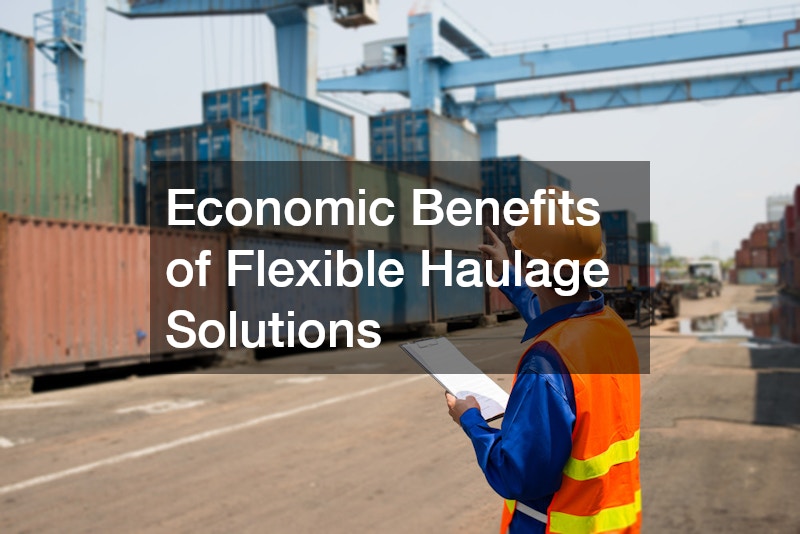In today’s fast-paced economy, businesses are under constant pressure to improve efficiency, cut costs, and remain adaptable in the face of shifting supply chain demands. Transportation and logistics play a critical role in shaping a company’s bottom line, and the way goods are moved—whether across towns or across continents—can significantly influence operational success. As industries grow more specialized and consumer expectations rise, traditional, rigid transportation systems struggle to meet the demand for speed, customization, and reliability.
This is where flexible haulage solutions step in. Unlike fixed-fleet operations or one-size-fits-all models, flexible transport strategies offer businesses the agility to scale their logistics infrastructure in line with actual needs. These solutions help reduce waste, optimize scheduling, and adapt to seasonal or unpredictable shifts in demand. As we explore the economic advantages of adopting a flexible approach to freight and logistics, we’ll see how specific tools, services, and innovations can contribute to more resilient and cost-effective operations.
Reducing Transportation Overhead Costs

An excellent example of targeted resource use in logistics is the strategic deployment of temperature-controlled trailers. These specialized units are vital for industries like food and pharmaceuticals, where maintaining precise temperature control is non-negotiable. In these sectors, temperature fluctuations can spoil perishable products, compromise safety standards, and even result in regulatory violations. As such, businesses that handle temperature-sensitive goods must ensure that their transportation systems can maintain specific conditions.
Companies can integrate temperature-controlled trailers into their logistics operations instead of maintaining a whole fleet of refrigerated trucks. This approach allows businesses to scale up their refrigeration capacity only when demand is high, such as during peak seasons, or when transporting specific products that require temperature control. By utilizing freezer trailers in this flexible manner, businesses avoid the high upfront costs and ongoing maintenance expenses of owning a fleet of refrigerated trucks year-round. Furthermore, this model ensures that companies only pay for refrigeration capacity when necessary, optimizing resource use.
One contributing factor to this cost reduction is the ability to share or rent specialized tools, such as heavy load handling equipment, only when they are needed. Instead of investing in expensive machinery that may only be used occasionally, businesses can access the right tools on demand through flexible partnerships. This prevents capital from being tied up in idle assets and improves the overall efficiency of logistics operations, ultimately leading to leaner and more profitable supply chains.
Enhancing Resource Allocation Efficiency
Efficiency in logistics isn’t just about faster deliveries—it’s also about smarter use of time, labor, and equipment. Flexible haulage solutions make it easier to allocate these resources where and when they are most needed. Companies can adjust fleet size and delivery frequency in real time, ensuring that operations stay lean without sacrificing service quality. This responsiveness allows businesses to avoid overstaffing during slow periods and reduce the risk of bottlenecks during peak times.
An excellent example of targeted resource use in logistics is the strategic deployment of freezer trailers. These specialized units are particularly crucial in industries such as food and pharmaceuticals, where maintaining precise temperature control is essential to preserve product quality and comply with regulations. Given the sensitive nature of the products, businesses must ensure that transportation capabilities are equipped to handle temperature-sensitive goods.
Companies can integrate freezer trailers into their logistics operations instead of maintaining a whole fleet of refrigerated trucks. By doing so, businesses only invest in these specialized units when demand is high or when transporting specific product lines that require temperature control. This flexible approach not only helps reduce fixed costs associated with owning a full fleet but also allows for a more efficient allocation of cooling resources, ensuring that companies only pay for the refrigeration capacity they need. As a result, this model supports cost-effective logistics while maximizing operational efficiency and minimizing waste.
Lowering Capital Investment in Fleet Ownership
Owning and maintaining a dedicated fleet of vehicles can tie up a significant amount of capital that might otherwise be used to grow the business. Between the upfront purchase cost, ongoing maintenance, and asset depreciation, fleet ownership often becomes a financial strain. Flexible haulage solutions offer an alternative by enabling businesses to access transportation assets as needed. This pay-as-you-go model allows organizations to convert fixed costs into variable ones, which is often more sustainable and scalable in the long term.
This is particularly valuable in sectors requiring significant investment in specialized infrastructure, such as industrial powder coating services. These operations often prioritize the quality and precision of their coating processes, which means large portions of capital are already directed toward machinery, materials, and skilled labor. By utilizing flexible transport models instead of owning a fleet, these businesses can free up funds for improving production capabilities or expanding service offerings. This financial agility can be a significant competitive advantage in highly technical industries.
Increasing Operational Scalability

Business needs are constantly evolving, particularly in fast-paced and competitive markets. Companies must remain agile to address fluctuating customer demand, seasonal peaks, and periods of rapid growth. Businesses risk falling behind or overstretching their resources without the ability to adapt quickly.
Flexible haulage solutions provide the scalability needed to respond to these challenges. By offering adjustable logistics capacity that can expand or contract as needed, companies can maintain continuity during peak periods or when introducing new products. This approach ensures that businesses can meet demand without committing to excessive resources that may go underused during slower times.
A key tool in this scalable approach is enclosed trailers, which offer versatile protection for various goods. Rather than maintaining a full fleet of these trailers—which may sit idle during slower periods—companies can integrate them into their logistics network when specific loads require enhanced safety, security, or weatherproofing. This on-demand model allows businesses to scale their transportation solutions precisely, keeping costs in line with actual usage and improving operational responsiveness.
Minimizing Downtime and Delivery Delays
In logistics, every minute counts. Delays in transportation can lead to frustrated customers, disrupted production schedules, and higher inventory costs. Ultimately, these setbacks can hurt a company’s bottom line and damage its reputation.
Flexible haulage solutions offer quick response times to issues like breakdowns, staffing shortages, or equipment failure. By tapping into a more extensive and adaptable logistics network, businesses can minimize the chances of service interruptions. This ensures consistent and reliable deliveries, helping to maintain customer satisfaction and operational efficiency.
Improved forklift training is a specific way to prevent such delays. This ensures that loading and unloading operations are performed efficiently and safely. When warehouse staff are properly trained, goods move in and out of vehicles more quickly, reducing idle time for drivers and limiting bottlenecks in the supply chain. Integrating workforce development with flexible haulage systems enhances reliability and ensures transport operations stay on schedule, even when demand or circumstances fluctuate.
Optimizing Route and Load Management
Improving route efficiency and optimizing load capacity are powerful strategies for reducing operational costs and minimizing environmental impact in transportation. These practices help ensure that every mile traveled and every vehicle deployed contributes to productivity. Avoiding empty runs and maximizing each trip’s value are essential for sustainability and profitability.
Incorporating real-time tracking, adaptive scheduling, and intelligent route planning can help support these goals. Flexible haulage solutions allow businesses to respond more agilely to variables like traffic, weather, and shifting demand. This dynamic approach leads to smarter resource use and more reliable delivery performance.
When these strategies are paired with high-quality logistics services, businesses can access expert planning, real-time analytics, and dedicated load consolidation and delivery scheduling support. This partnership ensures shipments are combined efficiently and routed through the most time- and cost-effective paths. The result is faster deliveries and a more environmentally conscious operation, reducing fuel costs and carbon emissions. It’s a strategic way to transform logistics from a cost center into a performance driver.
Improving Fuel and Maintenance Savings

Fuel consumption and vehicle maintenance consistently rank among the most significant expenses in transportation operations. Older or poorly maintained vehicles break down more often and use more fuel, driving up operating costs. These inefficiencies can quickly erode a company’s profitability and reliability.
Flexible haulage solutions help mitigate these issues by offering access to newer, fuel-efficient fleets that are regularly serviced and professionally managed. This approach leads to improved fuel economy, fewer mechanical problems, and more dependable performance. As a result, businesses can lower their transportation costs while maintaining consistent delivery standards.
These savings are especially valuable for sectors like industrial cleaning chemicals, where safe, timely delivery is crucial, and contamination or delays can carry steep consequences. Transporting these chemicals often requires compliance with strict safety regulations and vehicle standards. By utilizing modern, well-maintained fleets through flexible logistics providers, companies reduce the risk of equipment failure while also enjoying lower fuel and service costs. This enhances safety and budget predictability across the entire delivery process.
Supporting Seasonal Demand Flexibility
Many industries experience fluctuations in demand that follow seasonal cycles or irregular market patterns. A key economic benefit of flexible haulage solutions is the ability to adapt quickly without incurring long-term costs. Businesses can ramp up transportation capacity during peak periods and scale back during off-seasons, maintaining efficiency and avoiding the burden of underused assets. This elasticity is vital for staying competitive in industries where timing is everything.
A great example of this adaptability is transloading rail to truck operations. During harvest seasons or bulk material surges, companies must move large quantities of goods from rail systems to final destinations quickly and efficiently. By leveraging flexible transport strategies, they can increase their reliance on transloading only when necessary, without committing to full-time infrastructure. This approach balances capacity with demand, ensuring logistics costs align with operational needs.
Enabling Better Cash Flow Management
Effective cash flow management is essential for maintaining financial stability, particularly in industries with narrow profit margins or unpredictable demand. Businesses need the ability to adapt their spending in real time to stay resilient. Rigid cost structures can place unnecessary pressure on cash flow, especially during slower periods.
Flexible haulage solutions offer a clear advantage by turning large, fixed transportation expenses into scalable, variable costs. This shift helps companies align logistics spending with revenue, improving financial efficiency. As a result, businesses can better navigate lean seasons and respond more confidently to opportunities for growth.
This is particularly useful in sectors that rely heavily on consistent inventory movement, such as the distribution of industrial supplies. Rather than investing in dedicated delivery vehicles or long-term contracts that may not reflect actual usage, companies can adopt transport models that scale in real time with order volume. This dynamic structure frees up working capital, allowing businesses to invest in procurement, production, or sales initiatives without being burdened by the overhead of rigid logistics costs.
Strengthening Competitive Market Position

In competitive industries, delivering goods quickly, reliably, and at a lower cost can be a major differentiator. Companies that excel in these areas are better positioned to attract and retain customers. Speed and efficiency in logistics directly impact a business’s ability to respond to market demands.
Flexible haulage solutions help businesses meet these expectations by offering faster response times, customizable delivery options, and smarter resource use. This adaptability leads to a stronger reputation and improved client satisfaction. Over time, these advantages contribute to meaningful growth in market share.
Companies in the business of heavy construction products, for example, often face high customer expectations for timely delivery to job sites where every hour counts. With flexible transportation models, these companies can ensure rapid, on-demand distribution of large or irregular shipments without delays caused by limited fleet capacity or rigid schedules. This logistical edge allows them to promise—and deliver—greater reliability than competitors who rely solely on traditional, fixed systems.
As global markets grow increasingly dynamic, businesses must find innovative ways to manage transportation and logistics. Traditional models, while familiar, often lack the agility and efficiency that modern commerce demands. Flexible haulage solutions present a compelling alternative, offering the ability to adapt, scale, and optimize operations with far less financial and logistical friction. The economic advantages are clear and wide-ranging, from reducing overhead costs to enhancing scalability.
By strategically integrating tools and services, companies improve their operational capabilities and their bottom line. These solutions offer more than convenience—they deliver real financial value through more innovative resource use, better cash flow, and increased competitiveness. In a world where supply chains are under constant pressure, embracing flexible haulage is not just beneficial—it’s essential for long-term success.


